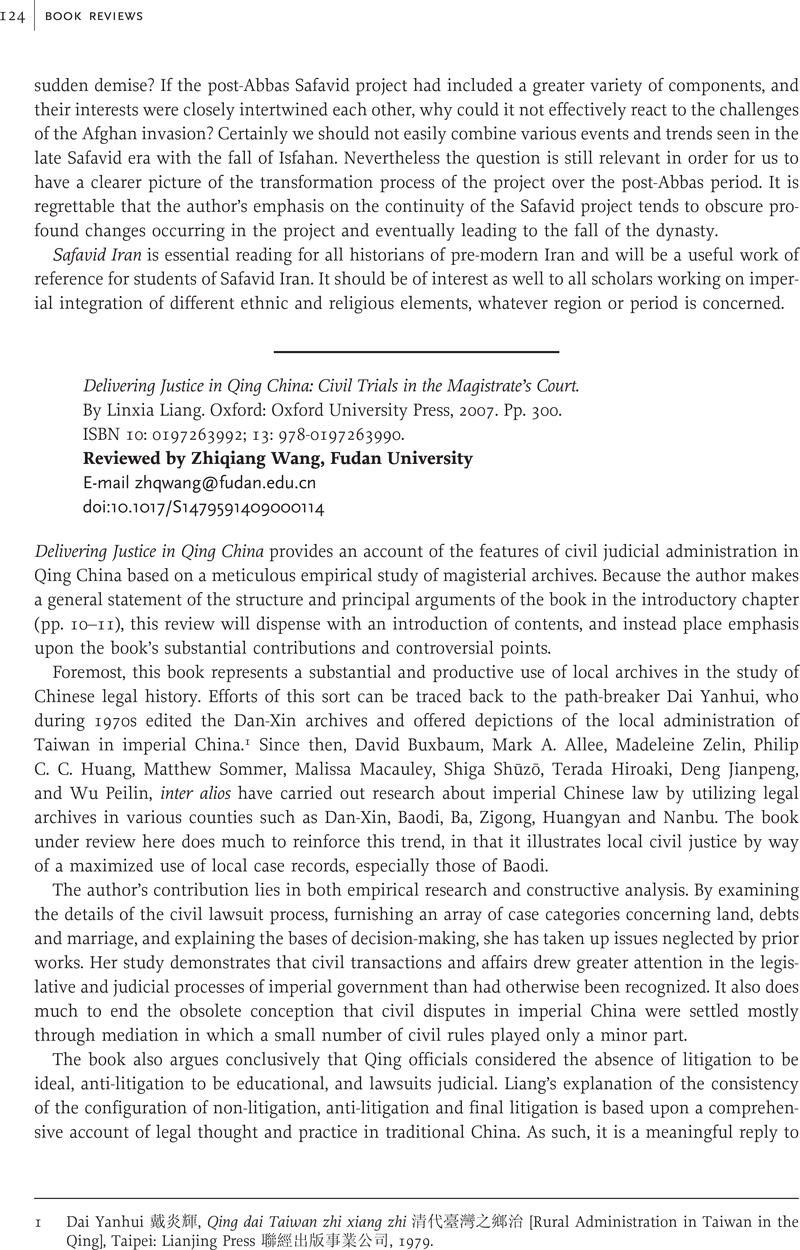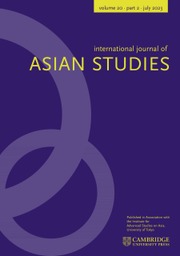No CrossRef data available.
Article contents
Delivering Justice in Qing China: Civil Trials in the Magistrate's Court. By Linxia Liang. Oxford: Oxford University Press, 2007. Pp. 300. ISBN 10: 0197263992; 13: 978-0197263990.
Published online by Cambridge University Press: 17 February 2009
Abstract

- Type
- Book Reviews
- Information
- Copyright
- Copyright © Cambridge University Press 2009
References
1 Yanhui, Dai 戴炎輝, Qing dai Taiwan zhi xiang zhi 清代臺灣之鄉治 [Rural Administration in Taiwan in the Qing], Taipei: Lianjing Press 聯經出版事業公司, 1979Google Scholar.
2 Huang, Philip C. C., Civil Justice in China: Representation and Practice in the Qing, Stanford: Stanford University Press, 1996Google Scholar.
3 The statistics of the rejected cases in Baodi (p. 61, Table 3.2) vary visibly from that of the author's article in Chinese (Liang Linxia 梁临霞, “论批呈词” [On Comments of Complaint], in Fa shi xue kan 法史学刊 [Chinese Journal of Legal History], 1, pp. 160, 168 (2007).
4 Presumably hard cases are more likely to appear in officials' casebooks than in archival records. Such a generalization is supported by Liang's description found in the book under review: decisions of cases that were not exactly consistent with code and thought to be hard cases often came from officials' personal collections (e.g., pp. 154–57, 163–64), while archive cases are more often said to be “simple and decisions are clear” (e.g. pp. 176–77, 194–95).
5 A basic list of those collections is available in Shūzō, Shiga 滋賀秀三, Shindai Chūgoku no hō to saiban 清代中國の法と裁判 [Law and Justice in Qing China], Appendix: 清代判牘目錄 [A Catalogue of Judgments in Qing], Tokyo: Sōbunsha, 1984Google Scholar; Shigemitsu, Morita 森田成滿, “Shin dai no hango” 清代の判語 [Civil Judgments in Qing] in Shūzō, Shiga, ed., Chūgoku hōseishi: kihon shiryō no kenkyū 中国法制史ー–基本資料の研究 [Chinese Legal History: A Study of Primary Sources], Tokyo: Tokyo University Press, 1993, pp. 739–58Google Scholar.
6 See Terada Hiroaki 寺田浩明, “Shin dai no shōrei” 清代の省例 [Provincial Regulations in Qing Dynasty], in Shiga Shūzō, ed., ibid., pp. 657–714.
7 Yuedong shengli 粤东省例 cannot be found in Guanzhenshu jicheng 官箴书集成, as referred to in the bibliography.
8 Article 20, 22 of the Code and accompanying sub-statutes. The provision favoring the poor has not been found in terms of a general pardon. The only exception is persons aged over eighty years, who are only financially responsible for certain serious crimes.
9 Hiroaki, Terada 寺田浩明, Shitan chuantong Zhongguo fa zhi zong tixiang 試探傳統中國法之總體像 [Traditional Chinese Law: A Composite Image], in Fa zhi shi yanjiu 法制史研究 [Journal for Legal History Studies] 9 (2006), pp. 223, 237–38Google Scholar.


